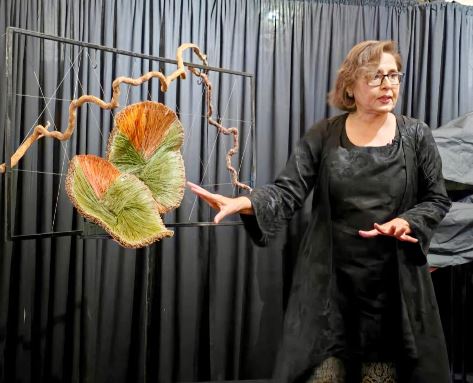Adnan Mughal
Women around the world are increasingly using technology and adapting it to their needs. Ecommerce can particularly help entrepreneurs, especially women in developing nations’ to overcome the usual market access and network challenges as internet-based enterprises can be operated at a very small scale. Moreover, e-commerce also reduces the cost associated with geographic distances, which implies potential gains for Micro, Small and Medium Enterprises (MSMEs) (including women owned/led enterprises) as they can go global more easily. With digital technology, women have been able to expand economic activity and increase outreach at a minimal cost. However, gender disparity in Pakistan has a significantly low ranking in the Global Gender Gap Index 2020, only ahead of Iraq and Yemen – with limited economic opportunities for women. Despite improvement over time, only half of the female population is literate, compared with 72.5 percent of male population. Female labour force participation stands at only 20.1 percent. Only 1 percent of women are engaged in entrepreneurial activities as opposed to 21 percent of men. Majority of women entrepreneurs are operating in the informal (MSMEs) space, and the concentration of women led businesses is confined to traditional female sectors such as textiles, beauty, food, agriculture and vocational training.
In the tech startup space, women entrepreneurs continue to face discrimination in opportunities and benefits offered by ICTs due to lack of access, resources, skills, and education. A key barrier for women entrepreneurs in the tech space is under-representation in tech knowledge and education. Currently, gender disparity is worst for women in digital/STEM careers in Pakistan. Only 16 percent of female computer science graduates are working versus 83 percent men. However, the rise of women-led startups in the last few years in the tech-space is a silver lining. Technology is enabling women entrepreneurs in Pakistan. With the rising variety of women-led small and medium enterprises seen operating online, many women-led startups are creating opportunities by using digital technology. These startups are mostly focusing on areas like e-commerce and retail – particularly clothing, fashion, accessories, food and catering, salon services, event management, health, and education services. While there is no social data to show the number of women-led startups, the startup.pk directory shows that 20 percent of the startups are founded or co-founded by women. Also, the rising engagement of the stakeholders is an indication of growth. Competitions, awards, donor-led challenges, investment by multiple national and international corporations are examples of these interventions bearing fruit. Also, the share of women tech startups in raising investment is improving, albeit slowly. Most women-led startups that have attracted investment belong to the e-commerce sector, health and health-tech, and education and ed-tech. There is also a rise in international as well as private sector initiatives to support women entrepreneurs especially in the tech space.
SheLovesTech (2019) a global platform for international tech companies, investors, entrepreneurs, startups, and consumers to promote technology for women and by women. It recently held a competition in Pakistan and provided winning business grants, and an opportunity to compete in a global challenge. SheLovesTech has till date disseminated 350+ hours of training and more than 100 hours of mentorship.
#SheMeansBusiness Programme (2019) launched by Facebook in partnership with Lahore Women’s Chamber of Commerce is to provide women entrepreneurs with tools, resources, training, and guidance to run a successful online business. WeCreate Center: It is a community center in Islamabad for women interested in entrepreneurial ventures. The center provides mentoring, training, a networking platform, access to media, markets, and capital along with the technological tools and resources needed for developing businesses.
Women in TechPk: Women community offering a platform to discuss professional and career-related issues, seek advice, find mentors and forge organizational alliances and individual collaborations. WE-NET: Pakistan Women Entrepreneurs Network for Trade (WE-NET) is a representative platform for women entrepreneurs in trade of goods and services being established with the support of World Bank Group Pakistan.
Karandaaz Women Ventures: Previously known as the Women Entrepreneurship Challenge – a flagship annual initiative of Karandaaz, provides growth capital and business development support to women led businesses to demonstrate their commercial viability for investment and making their portfolio bankable.
Financial Inclusion of Women Challenge (FIWC) & Digital Financial Solutions: Through this focused challenge, Karandaaz seeks to support solutions to address the critical issue of women missing out on opportunities otherwise possible through their financial inclusion such as having agency over money, savings, and access to credit. The program aimed at increasing use of tech by women to increase their economic participation.
The proportion of women having digital skills compared to men is perceived to be quite low in Pakistan, which prevents them from adopting technology in digital entrepreneurship. Presence of women in specialized areas that precondition higher level education will grow with increase in female graduates in Science, Technology, Engineering and Mathematics (STEM) subjects. Developing the passion and introducing and exposing young women to STEM subjects and opportunities at an early stage and university level will help address some underrepresentation. Co-operation between IT universities and business enterprises, digital skills apprenticeships for women and mentorship, financial support, and other technical/non-technical support can potentially clear the path toward digital entrepreneurship for women. Women also have less access to other digital learning platforms. Facilitation in the form of dedicated programs can increase the uptake of technology, which can indirectly boost their responsiveness to entrepreneurial opportunities. For example, digital divide has been badly exposed during coronavirus, impacting females harder because of their limited access to the internet and smart devices. In addition, new opportunities like digital health and remote learning/education have cropped up amid the pandemic, where women can monetize their skills better if they are better connected to digital technology. Government-focused programmers and schemes dedicated for women-led tech startups can also be an impetus in shifting women led businesses from conventional sectors into more technology related sectors. Tech startups and technology- enabled entrepreneurship both rely on digital tools like a website, smartphone app, telecom, online platforms or complicated management systems like ERP, supply chain management, payroll, funding etc. Equal access to these facilities through workshops and training for the adoption of digital tools will give a push to digitally enabled entrepreneurship. Finally, the wider ecosystem support, including Karandaaz, will need to strengthen and increase the financial and technical support instruments available as well as promote women role models, women IT experts and IT leaders to encourage aspiring female entrepreneurs.
The writer is a student at QAU.











